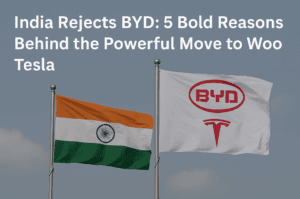India Rejects BYD: 5 Bold Reasons Behind the Powerful Move to Woo Tesla
India has turned down a $1 billion investment proposal from Chinese EV giant BYD, reflecting its cautious stance toward Chinese firms despite recent diplomatic easing. Commerce Minister Piyush Goyal confirmed the decision, citing the need to protect national strategic interests. This move aligns with India’s broader trend of restricting Chinese investments, as seen earlier when Great Wall Motors exited the market. At the same time, India is actively trying to attract Tesla, which has stayed out due to India’s steep 100% import duties on fully built cars.
These tariffs have long shielded domestic automakers like Tata Motors and Mahindra & Mahindra. However, with free-trade talks underway with the US and EU, India faces growing pressure to open up its auto sector. The government is aiming to become a global EV manufacturing hub but remains wary of potential dumping from China. This balancing act highlights India’s push to grow its EV market while protecting homegrown players and strategic interests.

India Rejects BYD: 5 Bold Reasons Behind the Powerful Move to Woo Tesla
India has officially blocked a $1 billion investment proposal from China’s leading electric vehicle (EV) manufacturer, BYD, signaling its growing wariness of Chinese investments in strategic sectors. At the same time, the country is actively pursuing Tesla, the American EV pioneer, to establish a foothold in its rapidly growing market. The move underscores India’s efforts to balance economic partnerships with geopolitical priorities, particularly amid ongoing tensions with China.
A Firm “No” to BYD
Commerce Minister Piyush Goyal confirmed the rejection of BYD’s plan during the India Global Forum in Mumbai, stating, “As of now, it’s a no.” He emphasized that New Delhi must prioritize national interests when evaluating foreign investments, especially in critical industries like electric mobility. BYD, which had partnered with a Hyderabad-based company for the proposal, aimed to manufacture EVs and batteries in India. However, the government’s reluctance to approve Chinese investments—a stance hardened since the 2020 border clash between the two nations—has stalled the deal.
BYD isn’t the first Chinese automaker to face hurdles. Great Wall Motors, another major player, abandoned its $1 billion India plans earlier this year after failing to secure regulatory approvals. These setbacks highlight the challenges Chinese firms face in a market where distrust of Beijing’s influence runs deep.
Tesla in Focus: Tariffs and Trade Talks
While shutting doors to Chinese companies, India is rolling out the red carpet for Tesla. However, the Elon Musk-led automaker has hesitated to enter the Indian market due to the country’s steep import taxes—currently 100% on fully built electric cars, the highest among large economies. These tariffs have long protected domestic manufacturers like Tata Motors and Mahindra & Mahindra, which dominate the affordable EV segment (priced under $25,000) and the compact SUV market.
Despite this protectionism, India faces pressure to liberalize its auto sector as it negotiates free trade agreements (FTAs) with the United States and the European Union. These deals could require India to lower trade barriers, aligning with global norms. For context, the U.S. imposes a mere 2.5% tariff on imported cars, Germany charges 10%, and China caps its duties at 25%.
Minister Goyal acknowledged India’s ambition to become a global EV manufacturing hub but stressed the need to guard against unfair trade practices. “We must remain vigilant against potential dumping of cheap Chinese products,” he said, referencing concerns that underpriced imports could cripple local industries.
Domestic Growth vs. Global Ambitions
India’s EV market, though smaller compared to China or the U.S., is expanding rapidly. Homegrown brands like Tata and Mahindra have capitalized on government incentives and rising consumer demand for eco-friendly vehicles. However, the lack of foreign competition in premium EV segments has limited choices for Indian buyers. Tesla’s entry could disrupt this dynamic, offering high-end models while potentially pushing domestic firms to innovate.
To attract Tesla, India is considering policy tweaks. Reports suggest the government might lower import duties for EVs priced above $40,000 to 15%—but only if automakers commit to local manufacturing within a set timeframe. This “carrot-and-stick” approach aims to balance market access with the broader goal of boosting domestic production.
Geopolitics Shapes Economic Choices
India’s dual approach—blocking Chinese investments while courting Western companies—reflects its broader strategic shift. By aligning more closely with the U.S. and EU, India aims to reduce reliance on China, which supplies critical components for industries like electronics and renewables. At the same time, fostering partnerships with Tesla and other Western firms could help India build a competitive EV ecosystem, create jobs, and meet its climate goals.
However, challenges remain. High tariffs, bureaucratic delays, and infrastructure gaps—such as limited charging stations—could deter even willing foreign investors. For Tesla, which prefers to test demand with imports before setting up factories, India’s tax structure remains a sticking point.
The Road Ahead
As India navigates these complexities, its decisions will shape not only its automotive future but also its position in the global clean energy transition. Balancing protectionism with openness, and domestic growth with international collaboration, will be key. For now, the message is clear: India welcomes investments that align with its economic and strategic priorities—but Chinese firms, especially in sensitive sectors, need not apply.
In this high-stakes game, Tesla’s next move—and India’s willingness to compromise—could determine whether the world’s third-largest auto market becomes a battleground for global EV supremacy.
You must be logged in to post a comment.